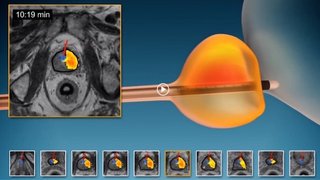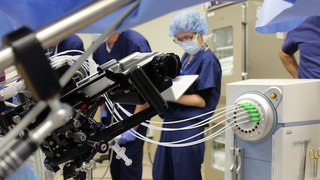Prostate Cancer Screening and Symptoms
There are usually no specific signs or symptoms of early prostate cancer. A prostate-specific antigen (PSA) blood test and digital rectal exam (DRE) provide the best chance of identifying prostate cancer in its earliest stages, but these tests can have drawbacks. Patients should speak with their physicians about whether prostate cancer screening is right for them.
If symptoms of prostate cancer do occur, they can include:
- Blood in the urine or semen
- Difficulty urinating or holding back urine
- Inability to urinate
- Nagging pain in the back, hips, or pelvis
- Pain or burning when urinating
- Painful ejaculation
- Urinating often (especially at night)
- Weak or interrupted flow of urine
Causes and Risk Factors
About 14 percent of men are at risk for prostate cancer. Approximately 5 to 10 percent of prostate cancers are hereditary. Other prostate cancers can have underlying environmental causes or can be caused by a combination of environment and genetics.
Family history is the most common risk factor for prostate cancer. Other risk factors – such as obesity, smoking, prostatitis, and vasectomy – have been suggested to increase the link for prostate cancer. However, a definite association has not been proven.
Patients should speak with a genetic counselor or their doctors for more details about these risk factors and protective factors that might reduce the risk for prostate cancers, as well as screening and preventive options.
Diagnosis and Imaging Services for Prostate Cancer
At UT Southwestern, our dedication to precision starts with prompt and accurate diagnosis. Our highly accurate diagnostic techniques include:
- Digital rectal examinations
- Prostate-specific antigen
- MRI-guided biopsy
- TRUS/MRI-guided biopsy (transrectal ultrasound/MRI fusion technique)
- Ultrasound-guided biopsy
If a patient is diagnosed with prostate cancer, our physicians will develop a unique plan of care. Because the disease usually grows slowly, we might recommend a “watch-and-wait” approach, also known as active surveillance, which involves close monitoring without treatment.
For patients who do require treatment, we offer advanced techniques that include medical therapies, radiation therapy, and surgery.
Our urologists and radiologists work together to provide additional options for men with suspected or confirmed prostate cancer, including MRI-guided transurethral ultrasound ablation of the prostate (TULSA).















